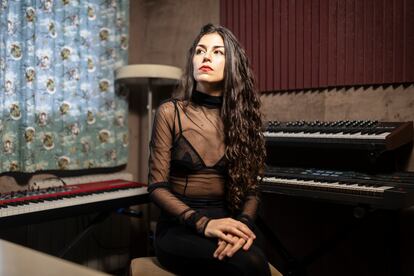A vocation could be defined as a two-sided mirror. On the one hand, you see yourself as you imagined, free to walk your path. On the other hand, you perceive that, with every step you take, that path narrows and narrows until it becomes your only alternative. Will there be other forks beyond, better destinations? Marina Herlop (Piera, Barcelona, 32 years old) feels something like this about the call she received from music. She does not know very well where her question came from, but she does feel irremediably compelled to follow her command.
While composing what will be her fifth album, the Catalan, born 32 years ago as Marina Hernández López, returns from climbing mountains like the Venice Biennale, where she provided music to Carlos Casas’ installation bestiaryand a Goya nomination for the song Chinas, part of the film of the same name. Now, he is preparing to give a concert at La Térmica in Málaga this Saturday, June 1, where he will headline, along with the Japanese Ryoichi Kurokawa, the first edition of the Foolk sonovisual experimentation festival.
The recital, where Herlop will present his latest published work, He doesn’t care (2023), he will be one of the few who offers to come out of his creative confinement once his new project is born. “I don’t know what’s going to happen, but I sense that it’s going to be a less pop album,” she explains, loquacious and poetic, on the other side of the screen from her home-studio in Barcelona. “I don’t know if it’s going to be pleasant or unpleasant to listen to, but I feel like I’m going to follow orders, I don’t know whose, in the end mine, right? But it’s like it’s not up to me to decide what the next album is going to be like, it’s like it’s already been written. I have to discover what I have to do and do it, and then whether the critics like it or not… it’s not my business”, he explains with a laugh.
That fearsome criticism, both national and foreign, undoubtedly approved of his previous proposals, luminous and indefinable experiments somewhere between classicism and pop art. The last two albums, He doesn’t care y Pripyat (2022), received praise from specialized media such as Pitchfork and stars like Björk, with whom she has been compared, and have performed on international stages from Sónar to the Barbican in London. Pripyat marked his definitive plunge into electronic music after two other albums, They can (2019) y Nanook (2016), more concentrated on Herlop’s original instruments: the piano and a voice full of enveloping and unpredictable harmonies that he sings as if inspired by the gift of languages, expressing himself in a language as phonetically beautiful as it is unintelligible (which combines, at times, with other recognizable ones such as Catalan and English).
With extensive use of the computer, Herlop added prodigious effects and textures to his songs, as well as a layer of complexity that emerged in He doesn’t care, an album as disconcertingly hypnotic as it is addictive. It was with that transformation that her career took a leap forward. “It was a time when I was approaching 30 and had made Pripyat, but it was very difficult for me to get it out,” confesses Herlop. “I was so discouraged that I was about to give up everything.”
With that all It does not refer to stopping composing—never, he assures—but rather to the search for his own space in the industry. “My ultimate goal was to be able to dedicate myself to music and make a living from it. This has happened and now I am assimilating it and seeing what my next ambition will be, if there is any ambition that surpasses this one,” she guesses. “I mean on the external level, on the work level. On an internal level there is always a lot of ambition, on an intellectual, creative level, to nourish oneself, right? To learn things. “That is infinite.”
This ethic of study and practice, in a certain monastic, transcendent way, is also what he applies to his work process. “All this that is happening demands time and energy from me that I would like to be dedicating to cultivating myself again,” he reflects. “To continue learning, because in the end, the cornerstone of my project is study. Because if not, the waters become corrupted. It’s like water has to circulate, and you have to continue learning, studying, honing your knowledge a little.”

Emerging from a “visceral” and inexplicable” attraction to music, Herlop’s training began at the age of nine. “Then I asked my parents to sign me up for the music school in my town and when I was little I played the piano a little, but as an extracurricular activity,” he says. After a break in adolescence, she returned to the conservatory during her university years. “When I was 19, I was in a group where she sang. There I saw that I wanted to play more and I wanted to give concerts, and then I thought: ‘Well, I’ll have to make my music if I want to play,’ and I started making my songs in a very natural and informal way. The first album was recorded at the house of a friend who helped me, and we did it in his room, that is, very DIY (do it yourself)”.
It is striking that, during his studies, Herlop studied journalism and humanities, two subjects linked to the drive to tell stories, and that in his songs he resorted to glossolalia, that incomprehensible language that refers to the gift of languages, to mysticism. one of those touched by a miracle, and that sounds both powerfully atavistic and palpitatingly modern. “Regardless of its language, of the narrative story that the lyrics of a song can tell you, another story underlies it, which is its structure,” he responds. “I believe, and more and more, that the structure of a song or a piece is the story it tells you, and it is decisive; It is the most important thing. It’s like the structure of a building: you can dress it however you want, but you have to think very carefully about what structure you want.”
If her previous references could include everything from the Carnatic music of South India to the classical and avant-garde music of the 20th century, from her current listening the artist cites an extraordinarily unique selection that includes “the songs of Georgia and the music of Gamelán (a traditional Indonesian music)” to “the drum and bass, flutes and vocal organizations.” “I still like the music that I have liked the most throughout my life,” Herlop acknowledges, “but there is something compelling that makes me change and follow a kind of Hansel and Gretel crumb, a path to explore.”
In this research, the ultimate aspiration may be to strip his music of everything superfluous, such as the visual aspect that accompanies it: the videos, the album covers and even the clothes he wears on stage, which generate a “universe.” ” of tastes foreign to sound. “In the end, what I want is to make music, and all the energy I dedicate to everything else I’m not devoting to music,” she explains. “I think it is one of the few refuges we have left against this almost dictatorship of the visual, although I don’t like to say that word, but it is like the eye is conquering all the terrain, and the beautiful thing about music is that it is something that It happens in the ear, it is something that is separate and I like to claim it, because I think it is part of the magic.”
Subscribe to continue reading
Read without limits
_

